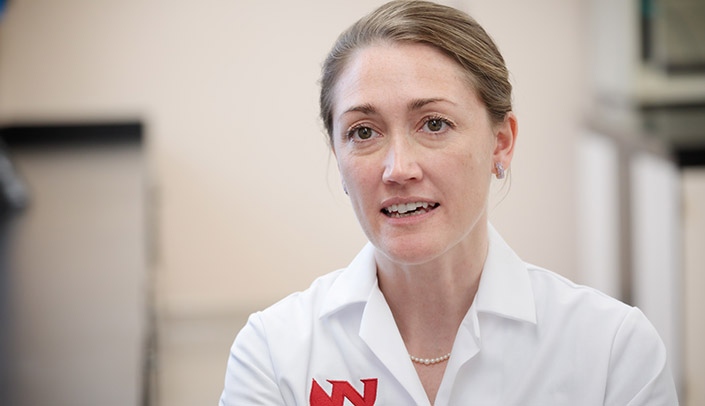UNMC is partnering with Omaha Public Schools (OPS) and One World Community Health Centers on a pilot program that would combine individual and environmental testing for SARS-CoV-2 — with a goal of detecting cases early, reducing transmission of COVID-19, and improving resource utilization across OPS schools.
Participating in-person learning students and all staff at pilot schools will receive free, weekly SARS-CoV-2 testing using a quick-turnaround saliva test developed at UNMC.
“This is to screen for infection in individuals without symptoms,” and thus catch cases early, said Jana Broadhurst, MD, director of the Nebraska Biocontainment Unit’s clinical laboratory.
Meanwhile, UNMC also will test the schools’ wastewater, indoor air and surfaces, looking for trends.
The Omaha Public Schools PROactive TEsting for Community Transmission of SARS-CoV-2 (OPS PROTECTS) will run Nov. 9-Dec. 11 at three OPS schools: Norris Middle School, R.M. Marrs Magnet Center, and Bryan High School.
“We are excited for the potential of this partnership in supporting safe and responsible learning environments and proud to be a leading school district in this effort,” said John Crowe, PhD, OPS director of strategy and innovation.
For these three schools, the UNMC team is prepared to test about 6,000 individual saliva samples a week, Dr. Broadhurst said.
That will require a lot of tests, a lot of lab work — and several volunteers. If you have health professions experience, please consider joining the pilot team as a volunteer.
When the OPS PROTECTS program goes district-wide, it won’t be testing some 53,000 students.
But, if the project goes as planned, it won’t have to.
“During the pilot we will be performing all of these testing modalities side by side,” Dr. Broadhurst said.
UNMC will monitor how the environmental samples match up with individual student test results.
Then, in a large district like OPS, the team can watch the environmental data, and pinpoint where to use individual testing more strategically.
“Ultimately in order to scale up a program to serve a community more broadly, we know that it’s not sustainable to perform individual testing across the community at all times,” Dr. Broadhurst said. “Our aim is to develop a strategy to identify hotspots of COVID-19 transmission. Then, deploy individual testing and follow-up services.”
UNMC College of Public Health and Global Center for Health Security personnel will analyze data from the pilot program to see how the findings can be interpreted in the context of community transmission.
At the end of the semester, the team will look to see how to best scale up services across OPS going forward.
The saliva tests employ a polymerase chain reaction (PCR) to detect genetic material of the virus.
The project will be paid for by OPS and philanthropic funding.
